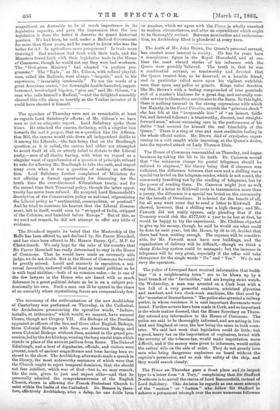The House of Commons reassembled on Thursday, and began business
by taking the bit in its teeth. Dr. Cameron moved that "the minimum charge for postaF telegrams should be- reduced to sixpence," his theory being that if sixpence was sufficient, the difference between that sum and a shilling was a special tax levied on the telegram-sender, which is not sound, the' community benefiting not by the sending of telegrams, bat by the power of sending them. Dr. Cameron might just as well say that, if a letter to Kirkwall costs in transmission more than a penny, the difference is a special tax levied on the community- for the benefit of Orcadians. It is levied for the benefit of all, for all may want some day to send a letter to Kirkwall. He showed, however, that a shilling was a high charge ; and Mr.- Fawcett did not really oppose, only pleading that if the- Treasury would risk the 2177,000 a year to be lost at first, he- would be happy to try the experiment. Mr. Childers objected to give up his money, though he said he would see what could be done by next year ; but the House, by 68 to 50, decided that there had been waiting enough. The expense will be consider- able, for Mr. Fawcett must have new buildings, and the organisation of delivery will be difficult, —though we think a cheap Echo-boy system could be managed; but the increase in telegrams will be very great, especially if the office will take threepence for the single words " No " and "Yes.?' We do not envy the operators.


































 Previous page
Previous page